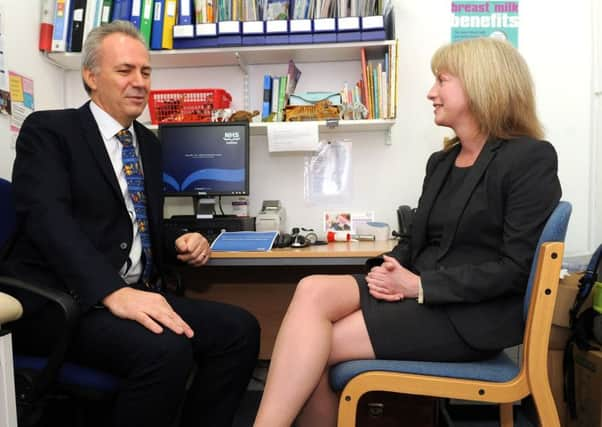Scott Macnab: Our politicians are not facing up to cutbacks


Jack McConnell’s pledge to prioritise education above other portfolios was depicted by the SNP as a de facto admission that NHS funding would be cut. The health service was even placed at the heart of the independence campaign by Salmond, amid warnings that back-door privatisation could take place in the event of a No vote – even though the NHS is entirely devolved to Holyrood.
Whatever difficulties the SNP may have faced in running devolved Scotland, the NHS has always been strong ground. That’s why a stark warning from the head of the British Medical Association (BMA) in Scotland, Dr Peter Bennie, that the service is “struggling to cope” with staff feeling overburdened and “burnt out”, will come as such a blow for Nicola Sturgeon, health secretary for most the SNP’s period in office. The Government’s management of the service is clearly called into question by the senior medic in an unprecedented broadside at the political elite in Scotland. Much-needed action plans to tackle the situation have been allowed to slip. Ministerial claims that funding has gone up “completely misses the point”, adds Dr Bennie, as this is being outstripped by the escalating demands of an ageing population, with spending on drugs going up by 10 per cent while emergency admissions have risen by 6 per cent.
Advertisement
Hide AdAdvertisement
Hide AdBut despite a growing awareness of the issues faced, there remains a sense of denial about reform needed to maintain an adequate health service. A recent report by the public spending watchdog Audit Scotland warned that the service is failing to meet key standards in a range of areas over budget shortfalls, with boards forced to resort to loans, one-off payments and a cut in private sector support to reduce payments. So it seems that the burden of power and balancing the books has seen the Scottish Government shift away from localism towards a more centralised approach to health service provision in Scotland. Generally one-off procedures like hip, knee and eye surgery will take place in major regional centres. Ministers insist that a tight cohort of surgeons performing these procedures on a regular basis will mean better treatment for patients. In truth it’s as much about saving money as anything.
The recent decision to close cleft pallet surgery for babies in Edinburgh and move this service to Glasgow is the shape of things to come in the NHS. The merger of health and social care services is also aimed at treating more Scots at home and tackling the return of bed-blocking in Scotland’s hospitals as older patients find themselves unable to leave as they have no suitable accommodation waiting for them. But with the health service now facing evermore competition from other parts of the devolved Scottish budget, it’s hard to see how any extra cash can be found. An additional £500 million has already been pledged to fund a childcare transformation which would see the introduction of effective full-time provision with the aim of seeing a generation of Scottish mums return to the workplace. And Nicola Sturgeon has signalled that education will be the priority of this government, with extra cash being made available to head teachers to help drive down the gap between schools in rich and poorer areas of Scotland. An overhaul of the schooling system is looming as regional clusters are created to foster good practice among schools.
The situation facing the health service in Scotland is not unique. It emerged recently that NHS England had seen a record number of cancelled operations, and boards south of the border are dealing with record deficits which have hit the frontline. Some hospitals have even been diverting patients away from A&E department which are struggling to cope, a situation we’ve thankfully not seen in Scotland. It emerged recently that NHS services are so stretched south of the border that patients who are seriously ill with eating disorders are being sent to Scotland – of all places – albeit to private clinics, not the NHS.
Scottish ministers insist the redesign of services will make health service sustainable but doctors’ leaders aren’t so sure and are now demanding an “honest debate” from the political class about how they see the service evolving in the future. Among the biggest barriers to change is the “political mileage” in railing against perceived cuts when change, and even centralisation, is the only answer. Given this is exactly how the SNP behaved in opposition, perhaps it’s understandable that the Tories and Labour won’t want to give Nicola Sturgeon an easy ride. But what’s the alternative? Reportedly, plans are being drawn up south of the border which would see sweeping closures of hospitals, A&E departments, massive bed cuts and the disappearance of maternity units as health services managers face up to the reality of perhaps the biggest financial crisis that the service has faced in its history. The so-called “sustainability and transformation plans” (STPs) include similar reforms to those being undertaken in Scotland – and cost-cutting has taken precedence in many of the proposals.
As hardline austerity continues to bite in the years ahead, the SNP will face a major challenge to avoid such an approach here in Scotland. The question is whether the Holyrood political class can take the politics out of the NHS and have the kind of national debate that needs to take place. It’s not happening at the moment and until it does the outlook will be increasingly bleak for the NHS in Scotland. And it won’t be long before warnings that the service cannot deliver what we expect from it will increasingly start to be heard from hospitals right across the country.